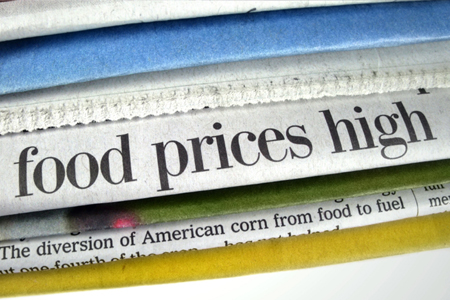UN Sees Risk of Unrest From Food Costs Above 10-Year Average
Category: Miscellaneous
 (Bloomberg) – Food prices may stabilize at high levels and keep government import bills near a record, increasing the risk of social unrest in the world’s least developed countries, the United Nations said.
(Bloomberg) – Food prices may stabilize at high levels and keep government import bills near a record, increasing the risk of social unrest in the world’s least developed countries, the United Nations said.
The UN Food & Agriculture Organization is asking international lenders to accelerate the release of funds to help poor countries cope with high food costs through subsidies and avert riots, Hiroyuki Konuma, assistant director general at the FAO, said in an interview.
UN Cites Risk of Unrest From High Food Prices
Daniel Acker/Bloomberg
Seed corn is loaded into a grain bin from a combine harvester in Sheffield, Illinois.
Seed corn is loaded into a grain bin from a combine harvester in Sheffield, Illinois. Photographer: Daniel Acker/Bloomberg
Global food costs are about 40 percent above the average in the past 10 years, according to a UN gauge, which tracks 55 commodities. Drought in South America, the biggest soybean-growing region, has wilted harvests, helping the organization’s measure of cooking-oil prices advance to the highest level in nine months in April, even as bigger supplies of corn, rice and wheat pushed cereal prices lower.
“This is the danger that we’re looking at,” Konuma said on May 3. When governments are unable to subsidize food and are forced to pass on higher costs, “then you see the youth riot and you have social unrest,” he said.
High food prices contributed to riots across northernAfrica and the Middle East that toppled leaders from Tunisia toEgypt in 2011. They also triggered more than 60 riots worldwide from 2007 to 2009, according to the U.S. State Department.
Soybean Shortage
Soybean futures surged to $15.125 a bushel on May 2, the highest level since July 2008, on concern global stockpiles of the oilseed crushed to make cooking oil and animal feed, will drop as production trails behind demand. July-delivery soybeans traded at $14.665 at 4:14 p.m. Singapore time today.
“This trend may continue the rest of this year and early next year,” Konuma said in Manila where he attended the Asian Development Bank annual meeting. “With the level of subsidies remaining high along with world prices, these countries would be facing greater deficits and hence would need to raise revenues, which in effect would put more distress on the poor.”
Government food import bills may total $1.24 trillion this year, 5 percent below the record last year, even as farmers boost planting of grains and dairy prices decline, Konuma said. The cost was $1.04 trillion in 2010, the FAO said last year.
To contact the reporter on this story: Luzi Ann Javier in Manila at ljavier@bloomberg.net
To contact the editor responsible for this story: James Poole at jpoole4@bloomberg.net




